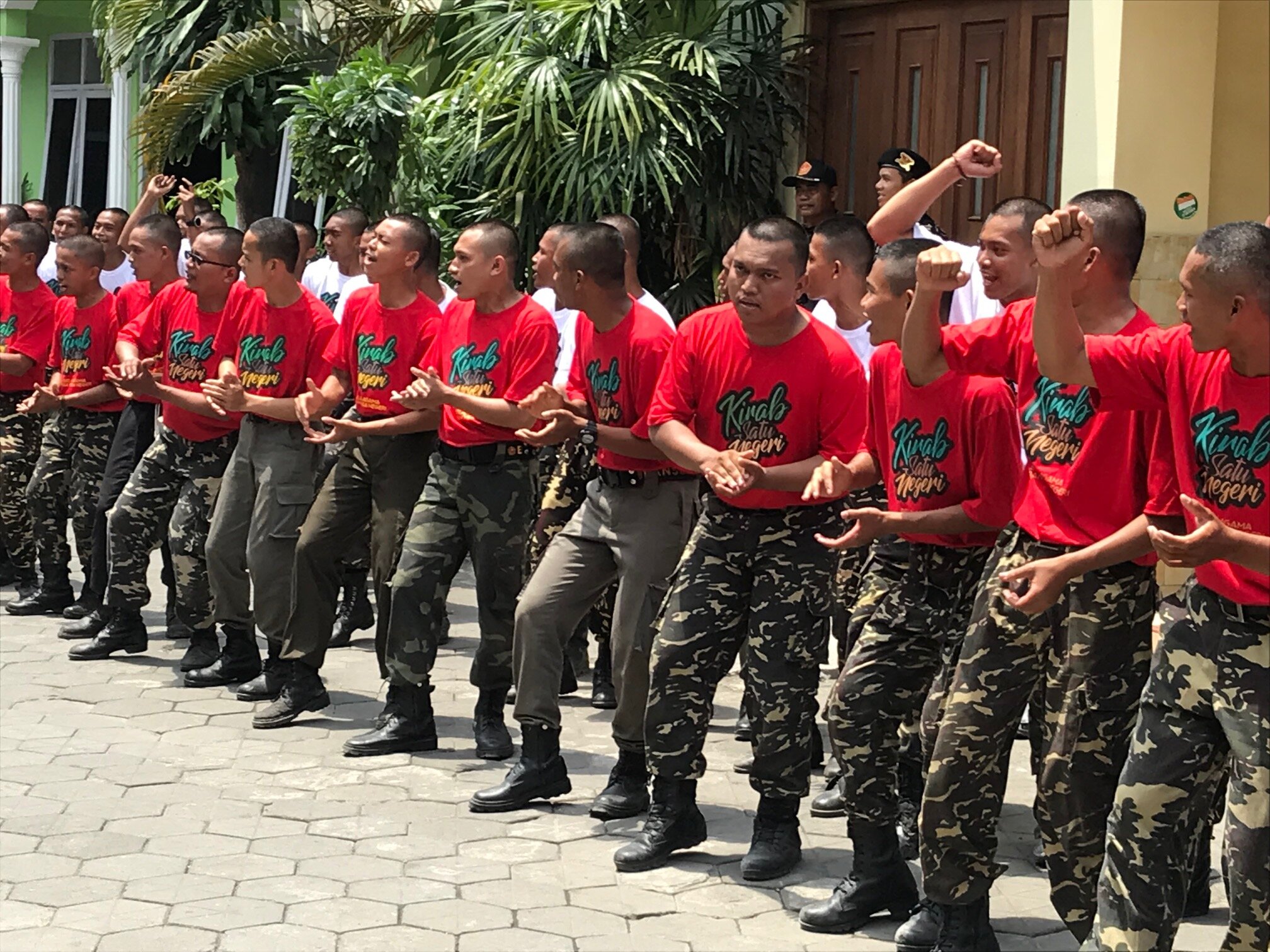Islamic militias are protecting churches in Indonesia
Members of the Multipurpose Ansor Front (Barisan Ansor Serbaguna), better known as Banser. Photo from official Ansor Twitter account.
(ANALYSIS) JAKARTA— Christmas is coming and so, in Indonesia, one of the world’s largest Islamic militias is mobilizing. Its members are usually young and fit, dress in camouflage uniforms, have military style training and marches and number in the hundreds of thousands. It has about twice as many personnel as all the Indonesian armed forces combined. These militia members are going to gather outside churches.
This sounds like a terrifying scenario, and in parts of the world it certainly would be. But very few, if any, Indonesian Christians are worried about the annual appearance of thousands of militia members on their doorstep. They are more likely to greet them with tea and cake.
The militia is the Multipurpose Ansor Front (Barisan Ansor Serbaguna), better known as Banser (Indonesians like to use abbreviated names for whatever can possibly be abbreviated). It’s a wing of the Ansor Youth Movement (GP Ansor) which is the youth wing of Nahdlatul Ulama (NU), the world’s largest Islamic organization.
Banser is a good organization. Its members are required to be unarmed and to coordinate their actions with the police. National Police Chief General Idham Azis has thanked them for help in securing last year’s Christmas celebrations: "Banser always joins to provide security during Christmas. I appreciate it."
A group of Banser men. Photo by Paul Marshall.
Banser carries out humanitarian operations, and it also when needed provides protection for Ansor and NU leaders. After Islamic firebrand Muhammad Rizieq Shihab was summoned by the police for violating quarantine restrictions, mobs surrounded the house of the cabinet minister responsible for police and security, Coordinating Political, Legal, and Security Affairs Minister Mahfud MD, and Banser members cooperated with the police in protecting it.
One of its other major functions has long been protecting churches from terrorists or extremists, especially at sensitive times like Christmas. After an attack on a church at Christmas in 1996, then head of NU Abdurrahman Wahid, who subsequently became Indonesia’s fourth President, ordered Banser to protect churches, and it has done so ever since.
Christmas can be an especially sensitive time since, as in much of the world, it has now taken on expansive, colorful displays and widespread commercial rituals—it is now very public in a way that Easter is not. In Indonesia, hardline Islamists have tried to shut down Christmas services and remove Christmas decorations, including Christmas trees, from shopping malls. There has been controversy of whether Muslims can wear Santa Claus hats, and whether store owners can require their Muslim salespeople to do so. As in parts of the West, even saying “Merry Christmas” has become a sensitive subject.
Paul Marshall (right) wears a Banser hat.
Banser’s commitment is symbolized most strikingly in the short life of Riyanto who, like many Indonesians, used only one name.
On Christmas Eve, 2000, in a time of major upheaval in Indonesian politics, there was a series of explosions, part of large-scale terrorist attacks staged by Al Qaeda and Jemaah Islamiyah. Riyanto was part of a Banser group of five sent to patrol and secure the Eben Haezer Church in Mojokerto, East Java, when he heard that a suspicious package had been found. He went to check it and found cables and wire. Realizing that it was a bomb, he yelled for people to get down, and ran with the bomb, looking to throw it into some ditch or remote spot. But it exploded in his hands and he was killed instantly. He was 25.
Bombs exploded in churches in nine Indonesian cities that night, killing 18 people and injuring many others, but that number might have been much higher had it not been for Riyanto. He has been hailed as a hero throughout Indonesia, a street in Mojokerto has been named after him, and a shrine to his memory, including his photograph and the remains of the shirt he wore, can be found at the NU museum in Surabaya.
It is of course sad that churches actually need protecting, but Banser’s actions not only protect them but also renew and strengthen interreligious relations. Banser member Muhammad Wasroni, better known as Bang Roni, told Vice, "The radicals, especially on social media, say we're priests' bodyguards... [but] Banser is my calling, I have no problem helping secure Christmas Mass. I see it as a way to make new friends, new brothers. This is ibadah. (worship, or service)…"
Paul Marshall is the Wilson Distinguished Professor of Religious Freedom at Baylor University, a senior fellow at the Hudson Institute’s Center for Religious Freedom in Washington, D.C., and a contributor to Religion Unplugged.



